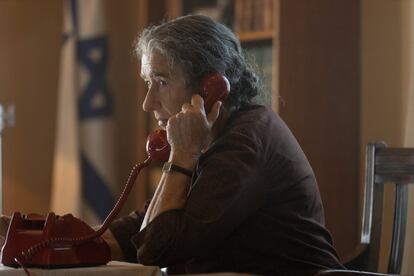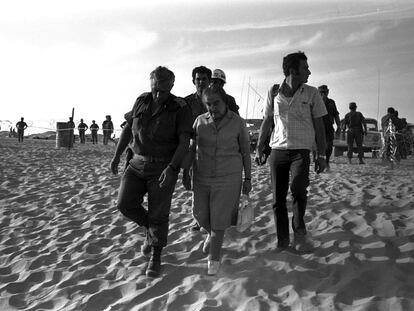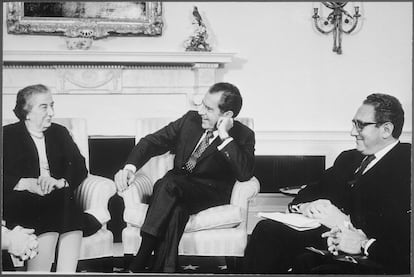A film about Golda Meir compels Israel to look in the mirror as it faces another crisis
Set during the 1973 Yom Kippur War, the movie stars Helen Mirren as the renowned prime minister

Any other year, it would have been just another movie premiere. But this year is different. With Israel gripped by a political and social crisis, the Jerusalem Film Festival kicked off on July 13 with Golda, a riveting account of former Prime Minister Golda Meir (played by Helen Mirren) navigating critical decisions against the ticking clock during the 1973 Yom Kippur War. The film has Israelis reflecting with a mix of nostalgia and concern about the country’s present situation.
While the circumstances are different, there is a sense that Israel is currently shaping its future, just as it did in 1973, when a surprise attack by Arab countries on the holiest day of the Jewish calendar almost crushed Israel until the United States intervened. In 2023, a reform to weaken Israel’s Supreme Court led by the most right-wing government in Israel’s 75-year history (a coalition of Netanyahu’s Likud party and ultranationalist and ultra-Orthodox groups) has sparked 30 weeks of mass protests, revealing social divisions and raising questions about the future of the Jewish state.
Drawing parallels is unavoidable. When Israeli President Isaac Herzog mentioned the threat that Israel faced in 1973 during the film festival’s opening, the audience chanted “Democracy!” — a slogan often used by opponents of judicial reform. On July 23, veterans of the Yom Kippur War protesting outside Parliament wore T-shirts declaring that they are once again fighting for their country.
The press conference in Jerusalem for Golda devolved into a barrage of questions about current national politics. Helen Mirren didn’t shy away from connecting the past and present then, nor in February at the Berlin International Film Festival. Mirren observed in Berlin that the government leader she portrays (with heavy makeup) would have been utterly appalled by Prime Minister Netanyahu’s 2023 initiative had she lived to witness it. The director, Israeli Guy Nattiv (a 2019 Oscar winner for Best Live Action Short Film for Skin), shared that he met a Yom Kippur War veteran during one of the protests and compared both times in Israel’s history. “In a way,” said Nattiv, “we are fighting to shape the future of our country.”

According to a review by Hebrew website Walla, the film (premiering in theaters on August 24) is expected to be a summer blockbuster in Israel, despite its questionable quality. The review suggests that the film will spark discussions and draw attention back to critical issues. It serves as a reminder of the sacrifices made to uphold democracy and reminds audiences that Israel was almost destroyed by its own mistakes in 1973. The review concludes by emphasizing the need to learn from past mistakes and maintaining a cautious outlook.
The film also sheds light on the different personalities and leadership styles of Meir, who served as the Prime Minister from 1969 to 1974, and Netanyahu (1996-1999; 2009-2021; 2022-). Meir, who was born in Kyiv in 1898, represented the pioneers of Labor Zionism, a movement that played a significant role in building and governing the country during its first three decades (1948-1977). Meir dressed simply and was known for making coffee for her ministers (the term “kitchenette” is often used today in Israel to refer to small political meetings). Fifty years ago, Prime Minister David Ben-Gurion even paid her a backhanded and sexist compliment by saying Meir was “the only man in my cabinet.”
Meir’s resignation followed a damning verdict from an investigative commission that exposed her poor readiness for the Yom Kippur War. “She knew that as the leader of the country, she had to take responsibility, and she actually did, unlike many others who, when things go wrong, start blaming others,” said Mirren in Jerusalem.
Netanyahu is his country’s longest-serving prime minister (16 years), representing Israel’s revisionist political faction. He has a penchant for luxury and is facing corruption charges related to gifts from billionaires, including pink champagne, cigars and jewels. Unfortunately, he is not particularly inclined to admit his mistakes.
Holding her ground
The movie tells the story of how Meir holds her ground during the war, unlike Defense Minister Moshe Dayan, as she receives negative reports from the battlefield, chain-smokes, and battles cancer and mental illness. By focusing on the three weeks of the Yom Kippur War from an Israeli perspective, the movie does not address other controversial aspects, such as Meir’s tough stance on Palestinians and her disdain for Mizrahi Jews from North Africa and the Middle East. When a group of Mizrahis bravely voiced their grievances about discrimination compared to Jews from Eastern and Central Europe (Ashkenazis), Meir memorably said, “They’re not pleasant.”
Although the film portrays her sympathetically, Meir remains unappreciated by her country, precisely because of her role before the war. In the hours leading up to the Arab attack, she rejected a request from Chief of Staff David Elazar to strike first, as her predecessor Levi Eshkol had done six years earlier in the Six-Day War that enabled Israel to triple its territorial control. “I know all the arguments in favor of a preemptive attack, but I am against it,” she told Elazar, according to her 1975 memoir. “We cannot predict the future, but there’s always a chance we may need help. However, if we attack first, we may not receive any support.”
Israel’s alliance with the United States in 1973 is another key connection to the present. The film delves into the complex dynamics between influential Secretary of State Henry Kissinger and a hesitant President Richard Nixon. Their collaboration was crucial in authorizing the shipment of 93 fighter planes and 26,000 tons of equipment. Two days before, Meir had described Israel’s battlefield situation as “absolutely terrible.”

One of the standout scenes in the movie is when Kissinger is persuading Meir to sign a ceasefire. At this point, Israeli troops are back on the offensive and are closing in on Damascus, with thousands of Egyptian soldiers surrounded. “Golda,” said Kissinger, “you must remember that first I am an American, second I am Secretary of State and third I am a Jew.” Meir quickly retorted, “Henry, you forget that in Israel we read from right to left.”
The tone of the anecdote stands in stark contrast to President Joe Biden’s six-month delay in inviting Netanyahu to the White House, an unprecedented snub compared to his predecessors. Biden described the Netanyahu government as the “most radical” he’s seen since he met Golda Meir as a U.S. Senator weeks before the Yom Kippur War. Interestingly, some protesters against judicial reform carry American flags.
Giora Eiland, a retired Israeli Army general, was recently asked by the Yediot Aharonot newspaper if he thought Washington would provide Israel with the same military support if needed today. “It’s not just about the cold diplomatic language used by the U.S. president. It’s about recognizing that if Israel found itself needing vital combat supplies like it did in 1973, it’s not completely clear if the current U.S. government would bother to help us like Nixon did.”
Sign up for our weekly newsletter to get more English-language news coverage from EL PAÍS USA Edition
Tu suscripción se está usando en otro dispositivo
¿Quieres añadir otro usuario a tu suscripción?
Si continúas leyendo en este dispositivo, no se podrá leer en el otro.
FlechaTu suscripción se está usando en otro dispositivo y solo puedes acceder a EL PAÍS desde un dispositivo a la vez.
Si quieres compartir tu cuenta, cambia tu suscripción a la modalidad Premium, así podrás añadir otro usuario. Cada uno accederá con su propia cuenta de email, lo que os permitirá personalizar vuestra experiencia en EL PAÍS.
¿Tienes una suscripción de empresa? Accede aquí para contratar más cuentas.
En el caso de no saber quién está usando tu cuenta, te recomendamos cambiar tu contraseña aquí.
Si decides continuar compartiendo tu cuenta, este mensaje se mostrará en tu dispositivo y en el de la otra persona que está usando tu cuenta de forma indefinida, afectando a tu experiencia de lectura. Puedes consultar aquí los términos y condiciones de la suscripción digital.









































